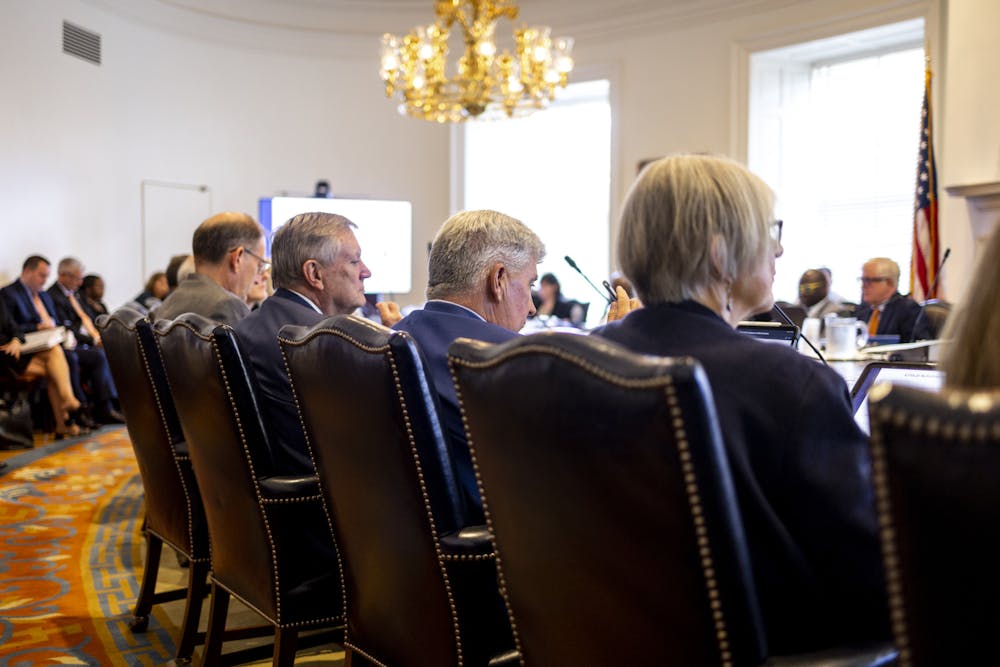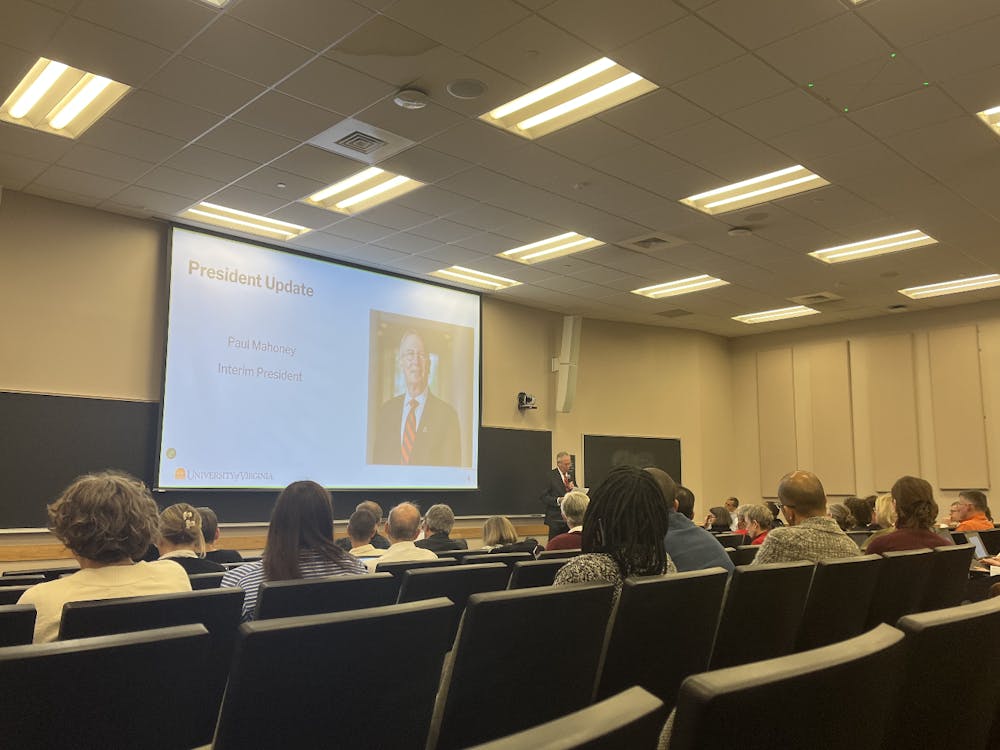The Board of Visitors Finance Committee met in an off-cycle meeting May 2 to hear an overview of the University’s budget process and gain context for the upcoming vote to approve the Fiscal Year 2025 budget. The Committee will review and vote on the budget when the full Board reconvenes for its June meeting.
Jennifer Wagner Davis, executive vice president and chief operating officer for the University, presented a general overview of the University’s budgeting process to the Board. In the presentation, Davis provided an overview of the budget’s three distinct categories, which include the academic division, medical center, and the College at Wise. In the Fiscal Year 2024 operating budget, the University allocated $2.25 billion, 3.04 billion and $0.07 billion respectively to these categories.
In her presentation, Davis also compared yearly inflation with tuition increases, noting that on average, tuition has increased by less than yearly inflation since the 2017-2018 academic year. Board member James Murray said that the Board was not receiving enough credit for the work done to keep down tuition costs at a time when tuition rates are increasing rapidly at other colleges and universities.
“I would say all the things that have happened in the past six or seven years with this Board, the most discouraging is that we're getting no credit for this,” Murray said. “There's common knowledge across the United States that higher education costs are skyrocketing. It's not happening at U.Va., thanks primarily to our endowment. But we continue to see stories that U.Va. tuition is out of control.”
Board member Douglas Wetmore disagreed, stating that recent rankings from national publications prove that the University is getting credit for its tuition and financial aid value.
“Don't we get ranked number one for most affordability by the national publications?” Wetmore said. “We’re ranked the best value, the best financial aid. I’m not being argumentative. I'm just saying it seems like we get all sorts of praise for the value.”
The committee also discussed the ways in which the University’s endowment, which totaled roughly $13.6 billion as of 2023, is invested. Davis said the endowment provides protection against inflation as well as long-term sustainability for the University, and stated the ways in which the endowment provides support to the University and supplements tuition and state funds. Among many other investments, the endowment helps fund strategic developments such as the new School of Data Science and Karsh Institute of Democracy, elements of President Ryan’s 2030 Plan, which includes a number of long-term goals and initiatives designed to improve the University.
“It [helps] to fund recruitment of world class faculty,” Davis said. “It allows us to have literally the premier undergraduate financial aid program among public schools, and [provides] strategic funding to advance the 2030 Plan.”
Davis also discussed the 2030 plan beyond the context of the endowment, speaking on the University’s Strategic Investment Fund’s history and current investments. The SIF was developed to provide funding to key initiatives of the 2030 Plan — elements called the “Grand Challenges,” which are priority research areas identified in the plan, as well as investments in scholarships and professorships. Davis also spoke on the progress the University has made towards realizing the goals of the 2030 Plan, citing the opening of the School of Data Science and the nearly-finished construction of the Contemplative Commons as recent accomplishments.
The presentation also included an overview of current evaluations examining cost efficiency and effectiveness at the University. These included a Commonwealth-wide study by Boston Consulting Group, a study examining operational efficiency and effectiveness at the University, and a Commonwealth-wide Cost Efficiency Study. These studies provide the University with information about how well the budget is being used, and how effective recent investments have been.
Davis also briefly discussed the anticipated budgeting issues which will come up in the Fiscal Year 2025, including inflationary cost increases, safety and security, investment in strategic plans, regulatory and compliance issues, and faculty and staff recruitment and retention. Davis explained that these issues are all necessary costs that the budget will have to accommodate.
According to Davis, next steps for the budget include continuing to make progress in the initiatives outlined by the 2030 Plan, as well as investing in faculty and student talent. Davis also gave the committee notice on upcoming key dates for the Finance Committee, which include the state government’s vote to approve its budget for state funding to universities, tentatively scheduled for May or June. This will affect how much state funding the University receives for the Fiscal Year 2025.
The Finance Committee will reconvene when the full Board meets June 6-7.
CORRECTION: A previous version of this article stated that the University's endowment stood at $13.6 million as of 2023. The actual number was $13.6 billion. The article has been updated to reflect this change.







